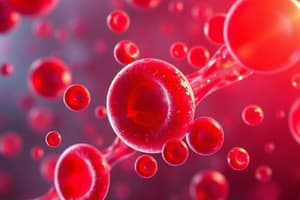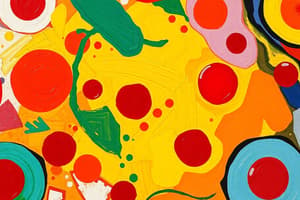Podcast
Questions and Answers
What initiates the process of platelet plug formation?
What initiates the process of platelet plug formation?
- Secretion of thrombin
- Release of anticoagulants
- Activation of coagulation factors
- Adhesion of platelets to damaged blood vessel (correct)
Which statement best describes the role of activated platelets during the plug formation?
Which statement best describes the role of activated platelets during the plug formation?
- They aggregate to form a stable structure. (correct)
- They maintain blood vessel integrity.
- They release factors that dissolve clots.
- They decrease blood flow to the area.
Which factor is primarily responsible for the activation of platelets?
Which factor is primarily responsible for the activation of platelets?
- Von Willebrand factor (correct)
- Thromboxane A2
- Fibrinogen
- Platelet factor 3
What is the result of platelet accumulation during plug formation?
What is the result of platelet accumulation during plug formation?
Which of the following conditions can impair platelet plug formation?
Which of the following conditions can impair platelet plug formation?
What role do platelets play in the clotting process?
What role do platelets play in the clotting process?
Which component is NOT directly involved in the clotting cascade?
Which component is NOT directly involved in the clotting cascade?
What is the final product of the coagulation cascade?
What is the final product of the coagulation cascade?
Which of the following best describes the sequence of events in the clotting cascade?
Which of the following best describes the sequence of events in the clotting cascade?
Which ion is essential for the coagulation process?
Which ion is essential for the coagulation process?
What is the main function of platelets during the clot reaction?
What is the main function of platelets during the clot reaction?
What is the physiological change that occurs when platelets react during clotting?
What is the physiological change that occurs when platelets react during clotting?
Which of the following is NOT a result of platelet activation in clotting?
Which of the following is NOT a result of platelet activation in clotting?
What role do platelets play in the stabilization of a clot?
What role do platelets play in the stabilization of a clot?
In the clot reaction, what substance is directly converted during the process?
In the clot reaction, what substance is directly converted during the process?
Flashcards
Platelet plug formation
Platelet plug formation
Platelets stick to the damaged part of a blood vessel, become activated, and start sticking to each other, forming a plug.
Platelets
Platelets
Platelets are small, cell-like components in blood that help in clotting.
Platelet activation
Platelet activation
When platelets encounter damage to a blood vessel, they change shape and release chemicals.
Platelet accumulation
Platelet accumulation
Signup and view all the flashcards
Platelet plug function
Platelet plug function
Signup and view all the flashcards
What is serum?
What is serum?
Signup and view all the flashcards
What is the clotting cascade?
What is the clotting cascade?
Signup and view all the flashcards
What are clotting factors?
What are clotting factors?
Signup and view all the flashcards
What is the extrinsic pathway?
What is the extrinsic pathway?
Signup and view all the flashcards
What is the intrinsic pathway?
What is the intrinsic pathway?
Signup and view all the flashcards
Clot Contraction
Clot Contraction
Signup and view all the flashcards
Fibrin Formation
Fibrin Formation
Signup and view all the flashcards
Clot Retraction
Clot Retraction
Signup and view all the flashcards
Why is the Clot Reaction Important?
Why is the Clot Reaction Important?
Signup and view all the flashcards
What are the key parts of the Clot Reaction?
What are the key parts of the Clot Reaction?
Signup and view all the flashcards
Study Notes
Body Fluids & Blood
- Body fluids are primarily water, with dissolved solutes like ions, metabolites, hormones, and antibodies.
- Plasma is the major liquid component, and proteins account for a significant portion of its solutes.
- Albumin, a major plasma protein (60-80% of total), plays a crucial role in maintaining blood pressure and fluid balance.
Blood Composition
- Blood plasma comprises ~91.5% water and ~8.5% dissolved substances (e.g., proteins, electrolytes, nutrients, hormones).
- Hepatocytes (liver cells) primarily synthesize plasma proteins like albumin, globulins, and fibrinogen.
- Formed elements of blood are cells or cell fragments: erythrocytes (red blood cells), leukocytes (white blood cells), and thrombocytes (platelets).
Blood Cell Types
- Erythrocytes (RBCs):
- Biconcave discs, increasing surface area for gas exchange.
- Lack nuclei and mitochondria; rely on anaerobic glycolysis.
- Primary function: transport oxygen and carbon dioxide.
- Life span: ~120 days. Removed by phagocytic cells in the spleen and liver.
- Contain hemoglobin, a protein that binds to oxygen, with 4 heme chains (containing iron).
- Leukocytes (WBCs):
- Diverse cell types crucial for immunity.
- Granular leukocytes (such as neutrophils, eosinophils, and basophils):
- Involved in phagocytosis and defense against pathogens.
- Important in inflammation.
- Agranular leukocytes (such as lymphocytes and monocytes):
- Participate in specific immune responses and phagocytosis.
- Develop into macrophages, crucial for chronic infections.
- Short-lived, with variable life spans (~few days, in some cases months or years).
- Thrombocytes (Platelets):
- Cell fragments, lacking nuclei.
- Play a role in blood clotting, aggregating to stop bleeding.
- Essential in homeostasis, forming plugs to prevent excessive blood loss.
- Produced by megakaryocytes, with a life span of ~5-9 days.
Blood Typing
- Blood groups (e.g., ABO, Rh) are determined by antigens on the surface of red blood cells.
- Matching blood types is crucial for blood transfusions to prevent agglutination (clumping) and hemolysis (destruction) of red blood cells.
Blood Disorders
- Anemia: Conditions characterized by low oxygen-carrying capacity, due to reduced RBCs, hemoglobin deficiency, or abnormal hemoglobin.
- Polycythemia: An abnormal increase in the number of red blood cells, making blood thicker and increasing the risk of blood clots.
- Leukopenia: An abnormally low leukocyte count, decreasing the body's defense against infections.
- Leukocytosis: An abnormally high leukocyte count, typically a response to an infection.
Hemostasis
- Hemostasis is the process of stopping bleeding, a crucial aspect of maintaining vascular integrity.
- It involves 3 key stages:
- Vascular spasm: Immediate vasoconstriction.
- Platelet plug formation: Platelets gathering to form a plug.
- Blood clotting (coagulation): Formation of a fibrin clot for permanent plugging.
- These steps occur within seconds to prevent significant blood loss and are regulated by clotting factors.
Studying That Suits You
Use AI to generate personalized quizzes and flashcards to suit your learning preferences.
Related Documents
Description
Test your knowledge on the role of platelets in the clotting process and the mechanisms involved in platelet plug formation. This quiz covers key concepts such as the activation and accumulation of platelets, factors affecting clotting, and the coagulation cascade.




